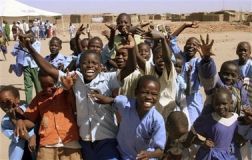Some South Sudan refugees prepare to head home
Nov 22, 2006 (SOBA ARADI CAMP) — Some of Sudan’s refugees are going home. Not those from Darfur, the vast western region where fighting and alleged genocide rage. But with a separate civil war ended in Sudan’s south, some of the more than 1 million refugees who have lived in squatter camps around Khartoum for decades are preparing to go back.
 “They’re the lucky ones. I don’t know how long we’ll be here for,” said Salahedin Ahmed, a refugee from Darfur watching as a small crowd of southerners waited this week at an aid agency tent to register for the trip home.
“They’re the lucky ones. I don’t know how long we’ll be here for,” said Salahedin Ahmed, a refugee from Darfur watching as a small crowd of southerners waited this week at an aid agency tent to register for the trip home.
In a country wracked by decades of humanitarian crises — drought, famine and at least two wars — the refugees from Sudan’s many ethnic groups are taking a risk they will go home only to be caught up again in unsettled political struggles.
Yet people consider the first large-scale return of refugees to be progress.
About 6.5 million of Sudan’s population of 40 million are living away from their homes. Government officials estimate about half the displaced live around Khartoum, the booming national capital in the north.
Of those, at least 1.5 million live in camps on the capital’s outskirts, the U.N. International Organization for Migration says.
Some camps are legal and relatively well-furbished. Others, like Soba Aradi, are sprawling wastelands where tens of thousands live in mud-brick shacks amid garbage-strewn streets, fearing police raids and expulsions.
The camp is a microcosm of Sudan’s ethnic differences:
The first of Soba Aradi’s 60,000 squatters arrived from Darfur around 1984, when a severe drought killed tens of thousands there.
They were soon joined by tall, lanky Dinka tribesmen fleeing the civil war that devastated southern Sudan from 1983 until a 2005 peace agreement.
Others trickled into the camp from other Sudanese regions.
Then, after a 2003 rebellion and bloody government retaliation turned Darfur into the world’s worst humanitarian crisis, yet another wave from Darfur poured in.
“The army attacked my village. Three of my brothers were killed (and) we just took our children and ran,” said Saifa Abdurahim, a 25-year-old woman from north Darfur who has lived in the camp more than three years.
She told of a harrowing five days of walking and hiding from pro-government militiamen until she and surviving relatives reached a railway station in the Darfur town of Nyala.
“When I saw the train, I knew we were saved,” she said, adding that they hitched a ride to Khartoum.
Aid workers estimate several hundred thousand people from Darfur could be living around Khartoum, although the vast majority of the estimated 2.5 million people who have fled their homes in Darfur have gone elsewhere in that region or crossed into Chad.
Abdurahim said she has no plans to go back. “Life is difficult here, but it was even harder in the village,” she said.
In contrast, many southerners seem eager to go home.
The south is due to vote whether it wants to choose independence by 2011, and the semiautonomous southern government is eager to get its people back by then — because it assumes they will vote for independence.
But the national government in Khartoum, which is wary of losing grip on the oil-rich south, has only grudgingly agreed to help with the returns, and the two sides often haggle over the program.
The northern government and its southern counterpart say they plan to repatriate 300,000 people by the end of 2007. South Sudan officials say they want everyone back, and will run their own return program if they feel the north, and the United Nations, don’t move fast enough.
A survey by the International Organization for Migration estimates 70 percent of the southerners in Soba Aradi and other camps around Khartoum want to leave.
“We’re not encouraging people to go. They want to,” said Robert Turner, who coordinates the return program for the U.N. mission.
Allen Cham Obu, 49, is one of them. He has spent nearly half his life in squatter camps around Khartoum.
“Even if there is still some shooting, I want to go home,” he said, clutching four of his six young children as he lined up at a U.N. tent to register for the journey south.
He said he knew it would be hard to readjust to country life, farming on his family land.
“But here, I don’t even have enough money to feed the children,” he said, pointing at his youngest infant, whose sparse, discolored hair revealed chronic malnutrition.
(AP)
